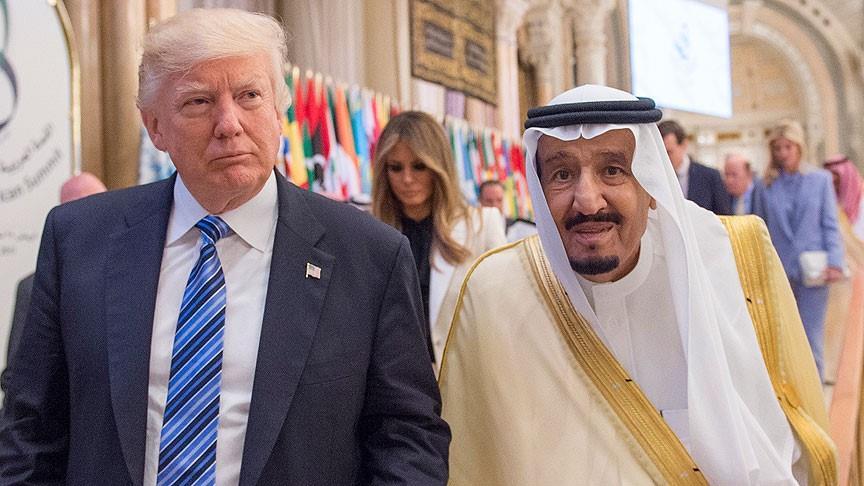The reign of the Trump Administration has seen a disregard for the proper channels for diplomacy with the President engaging in informal and almost mocking bonhomie with Saudi Arabia. The recent comments and tweets made by Trump available to the world have sparked a newfound interest in the growing ties between the two nations.
From Bear Hug To Luke-Warm Handshake – What Has Gone Wrong Between Modi and Trump?
The official establishment of the state of Saudi Arabia was declared by Abdul Aziz Ibn Saud’s capture of Riyadh in 1902 from Rashidi Emirate and the completion of the Saudi state was made after the accession of the Hejaz region in 1924 and Asir, Jizan and Najran in 1934.

The state lasted at the beginning of the twentieth century based on the goodwill of the British Empire. But the British dissolution in the Middle East post World War 2 and their attempts to redraw Middle Eastern and Saudi borders brought in much scepticism.
An alternative was found with the United States of America as they did not meddle in Saudi matters of state and engaged itself in commercial pursuits of Saudi oil reserves. From the founding of Saudi to the present day, US relations have been amicable and Washington has been their guarantor of national security against the competing forces in the region.
The increased US impetus on the oil and hydrocarbon reserves in Saudi Arabia has kept Washington interested in the region. The relation is purely based on shared interests and no common values.
Russia, Iran, Trade or Trump: Which is The Biggest Obstacle To Great US-India Relations?
US – The Guarantor of Security For Saudi Arabia?
The role of the security guarantor came when the US President Franklin Roosevelt met with the King Abdul Aziz Ibn Saud aboard USS Quincy. The pact continues to this day. With the incumbent Crown Prince Mohammed Bin Salman keen on signing defence agreements with the US, the relations are only bound to consolidate further.
Europe Frustrated With Donald Trumps Aggression and Banters: Bloomberg Report
The fact that one of the countries is a democratic, liberal institution running on values of equality while the other nation harbours a monarchy that runs exclusively on family privileges with a monopoly on power and wealth is a clear indication of an absence of common values. The relationship is purely based on mutual interests as the US gets unrestricted access to the world’s biggest producer of crude oil and Saudi Arabia gets the security guarantee from the superpower – The United States of America.
Many historical examples indicate this shared interest. When the monarchical regime of Yemen collapsed and anarchy spread in the country, the Nasser government in Egypt also included itself in the conflict and threatened the sovereignty of the southern borders of Saudi.
Then-President John Kennedy assured King Faisal that the US would do everything in its power to uphold and protect Saudi sovereignty. The establishment of the military base in Jizan was not to “protect the Southern borders” but to protect the oil-rich Eastern province. The Yemeni civil war is just as much a problem now as it were in the 1960s. The US has ensured the safe passage of oil deposits and transport routes for cargo in the region from the many isolated attacks on oil tankers and such.
Donald Trump – Spoiling it All?
The Trumpian philosophy of brazenness may be mocking but it has never been more evident that the alliance is based on buying security guarantees from the US with the petroleum money. The fact that the Saudi administration has kept quiet in the face of jibe from the US happens to be one of the prices it must pay for their continuing relationship.
Why Did The US Suddenly Declare Baloch Liberation Army As Terrorist Organization?
The pursuit of the Middle East Policy by the US has primarily been to isolate the cash-cow that is Saudi Arabia by ensuring their protection nowhere else but under the US blanket of mutual interests. If one is to look closer, it is the US itself that has increased the threat to Saudi sovereignty more than anyone.
The US allowing Saddam’s entry into Kuwait (1990), invasion of Iraq (2003) and withdrawal of troops exposing the nation to Iranian scourge, direct and indirect support during the Arab Spring (post-2010) and signing a nuclear deal with Iran (2015). All these have resulted in Saudi Arabia buying more and more defence armaments from the US defence industry. A cyclic profit margin promoted and consolidated by the US itself.
The only way out from this hegemony that the US has been putting the nation through is by indulging and strengthening ties between the government and the citizens. Without giving up the pointless wars for dominance and territory with major players in the region, without reduction of enemies in the region and increasing of friends in the region; the future is bleak. Until then one can be sure that the US would without any mercy dry the Saudi resources to its teat.




